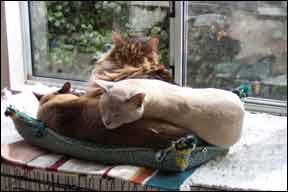One of your beloved cats died several weeks ago, and you’ve been feeling pretty down. Friends who have been through the same experience tell you this is normal after such a loss. But then you notice that your other cat is eating less, and wanders around the house, yowling, as if he was looking for his lost companion. Do cats grieve like we do? And if so, how can we help them?

288
There is now evidence that animals experience emotional responses to significant changes in their environment — and this includes going through the grieving process after the loss of feline or human companions. “What is important for people to realize is that the same brain neurochemistry that allows humans to feel is the same neurochemistry that many animals have — including cats. Cats can mourn,” says Emily Levine, DVM, board-certified by the American College of Veterinary Behaviorists.
Signs of Grief. We once thought that all cats could be happy as loners, and many apparently are. But experts now believe that animals derive benefit from the companionship of other cats, just as humans need each other. The bond between cats or other animals — and humans — can be intense. When this bond is broken through death or separation, the surviving cat may go through a real grieving process.
Cats may act any number of ways because it is an individual process. But there are some common behaviors. These include loss of regular appetite (even to the point of fasting); changes in sleep patterns; lack of play; excessive howling or becoming very silent; staring out the window for periods of time; and even wandering aimlessly around favorite spots of the deceased companion. Your cat may cling to you or may prefer to be alone.
But there can also be some surprises. If the relationship between the cats was strained, some cats may appear happier when the other is gone. “If the second cat is happier after the passing away of the other cat, I would be less likely to introduce a new cat companion,” says Levine.
According to Levine, mother cats may grieve for their kittens if the kittens meet an untimely death, or if they are taken away very early (usually less than six weeks after birth). The best thing is to allow the mother to wean her kittens naturally, if possible.
The grieving process usually resolves itself in one to six months. However, if your cat is losing weight, or engaging in grieving behaviors that seem extreme or prolonged, take her to the veterinarian to make sure that a physical problem is not causing any of the behavioral changes. Here are some steps you can take to ease this time of transition:
- Keep the rest of your cat’s life as stable as possible. Feed and groom her at regular times. Try to be around her as much as you can. Play with her.
- Encourage your cat to eat. Don’t abruptly switch his brand of cat food because this could lead to digestion problems.
- If you need to entice him, try adding a little liquid from a can of waterpacked tuna to his meal.
- If a cat has lost a human companion, “it may help to leave something with the former companion’s scent on it for the cat to smell,” says Levine. The same applies for keeping an item that’s been used by a now-missing or deceased animal companion.
- If the cat develops some annoying behaviors — such as extra howling or aggression — you shouldn’t scold the cat. “One must approach these cats with the utmost concern and care,” says Levine.
- Provide extra love and attention. This will help both you and your cat.
- Just spend some additional time (if your cat allows) stroking or grooming him. If your cat seems in the mood, play with him. All these activities will help him come to terms with the loss of his companion.
When to Start Anew. You may want to get another cat right away, but it’s usually best not to rush into things. Wait until your cat’s signs of grief resolve and she has regained her former energy. And you should also wait until your own grief has subsided. When the whole family seems emotionally ready, then it’s time to introduce a new feline member to the household.
“If you are going to try to introduce a new companion, make sure that the cats are introduced very gradually to each other, and that their first meetings are always associated with positive events — feeding, attention, play.”



